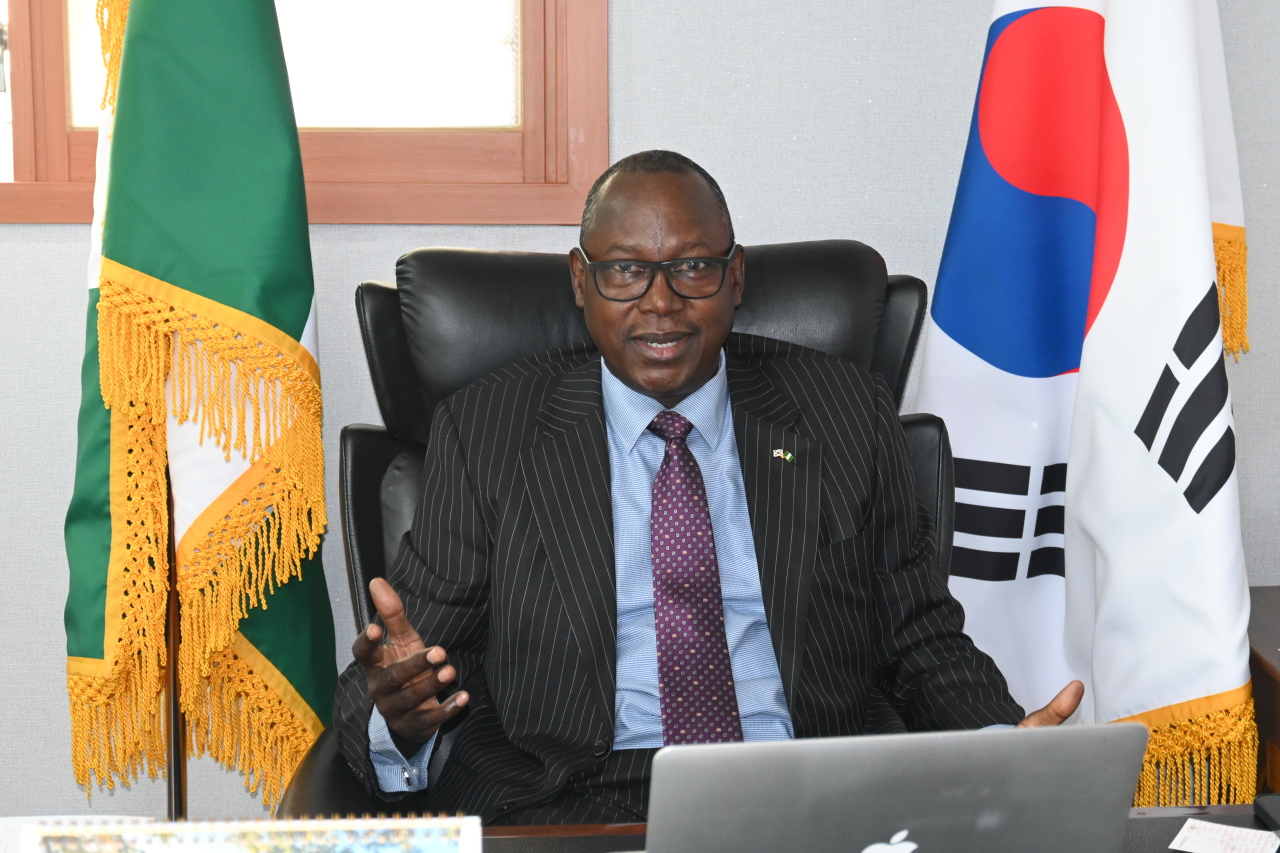Nigeria, Korea to boost cooperation on climate change, strengthen economic ties
By Sanjay KumarPublished : Oct. 12, 2021 - 14:51

The Nigerian government is responsively taking steps to address climate change, establishing a ministry for environment and advancing cooperation with Korea on climate change, Ali Magashi, Nigerian envoy to Korea, said in an interview with The Korea Herald.
According to the Nigerian ambassador, Africa is the “greatest victim” of climate change. Nigeria, Africa’s most populous country, has seen increases in drought and extreme flooding in recent years that has damaged agricultural production -- the source of livelihood for many Nigerians.
Nigeria, one of the beneficiaries of the UN’s Green Climate Fund, has received $170 million in funding this year to support various climate projects, and is set to secure another $100 million by the end of the year, according to Magashi.
The GCF, headquartered in Songdo, Incheon, is mandated to help developing countries realize their national greenhouse gas reduction goals, or Nationally Determined Contributions.
The Nigerian government has pledged to cut greenhouse gas emissions by 20 percent by 2030 compared to “business-as-usual” levels, and up to 45 percent on condition of international aid.
“Bilateral initiatives with the Nigerian Ministry of Mines and Power that address green energy in Nigeria are underway, there are lot of initiatives existing with Korea and Nigeria stakeholders on addressing climate change issues,” Magashi said.
Nigeria has sent a proposal on climate change initiatives to the Korean government that would involve the nonprofit Global Green Growth Institute and cooperation is underway, Magashi said.
Magashi also highlighted Nigeria’s efforts to advance cooperation on science and technology with Korea.
Nigeria has established a Ministry of Communication and Digital Economy and the Nigeria Information Technology Agency, which aims to provide ICT infrastructure for development. He added that the Nigerian embassy is collaborating with Korea Development Institute, a national think tank here, and Korean agencies, for technology exchange in ICT development.
Looking forward, Magashi said his government is hoping to boost interactions between midsize Korean companies and their Nigerian counterparts.
“Nigeria is a huge consumption economy and market (that is) under process to create technology exchange with new investments, transfer of technology and building capacity,” he said.
Magashi shared plans on holding a Korea-Nigeria Joint Commission with an intent to create government and business sector delegations that will maintain contact with Korea’s midlevel companies and SMEs.
“Korea-Nigeria Joint Commission would enhance startup cooperation and ratify numerous treaties on trade, tax, defense cooperation, execute treaties to strengthen corporate cooperation and building institutional capacity to further the bilateral relations,” he said.
Magashi said Nigeria, Africa’s largest oil and gas producer, already has strong ties with Korean companies. Daewoo E&C operates a Nigerian bilateral gas project, Samsung and Hyundai Heavy Industries are engaged in making LNG trains for Nigeria and Hyundai Mipo Dockyards are making three LPG vessels.
“There are lots of EPC projects such as bridges, tunnels and LNG trains,” he said. EPC refers to engineering, procurement and construction contracts.
On why not many Nigerian companies are operating in Korea, the envoy said Nigeria is still a developing country, with a young 22-year democracy and 60 years of independence.
It still faces institutional challenges and is difficult for Nigerian companies to directly compete with Korean companies. It would require enormous support from the Korean government and financing institutions to support overseas exports of Korean products.
However, the envoy said mega banks in Nigeria are now supporting Nigerian companies and offering collaborative opportunities to partner with overseas companies in different sectors.
“Nigeria now has a development institution and financial systems, and very soon a Nigerian bank in Korea with Nigeria’s sophisticated and easy operations in international banking transactions and capacity is likely to be established,” Magashi said.
Separately, Magashi also expressed his views on the COVID-19 pandemic, saying that the Nigerian government was greatly concerned on how to curb the virus’ spread within its population of over 200 million.
“Before the first case of COVID-19 in Nigeria, the Nigerian government already put the presidential task force to tackle COVID-19 putting all the institutions together, led by the Nigerian Center for Disease Control, and coming from the experience of Ebola not too long before, Nigeria had a very effective disease control infrastructure and the system went into action immediately with responsiveness in controlling COVID-19,” he said.


![[AtoZ into Korean mind] Humor in Korea: Navigating the line between what's funny and not](http://res.heraldm.com/phpwas/restmb_idxmake.php?idx=644&simg=/content/image/2024/04/22/20240422050642_0.jpg&u=)
![[Exclusive] Korean military set to ban iPhones over 'security' concerns](http://res.heraldm.com/phpwas/restmb_idxmake.php?idx=644&simg=/content/image/2024/04/23/20240423050599_0.jpg&u=20240423183955)


![[Herald Interview] Why Toss invited hackers to penetrate its system](http://res.heraldm.com/phpwas/restmb_idxmake.php?idx=644&simg=/content/image/2024/04/22/20240422050569_0.jpg&u=20240422150649)
![[Graphic News] 77% of young Koreans still financially dependent](http://res.heraldm.com/phpwas/restmb_idxmake.php?idx=644&simg=/content/image/2024/04/22/20240422050762_0.gif&u=)







![[Exclusive] Korean military to ban iPhones over security issues](http://res.heraldm.com/phpwas/restmb_idxmake.php?idx=652&simg=/content/image/2024/04/23/20240423050599_0.jpg&u=20240423183955)



![[Today’s K-pop] Ateez confirms US tour details](http://res.heraldm.com/phpwas/restmb_idxmake.php?idx=642&simg=/content/image/2024/04/23/20240423050700_0.jpg&u=)